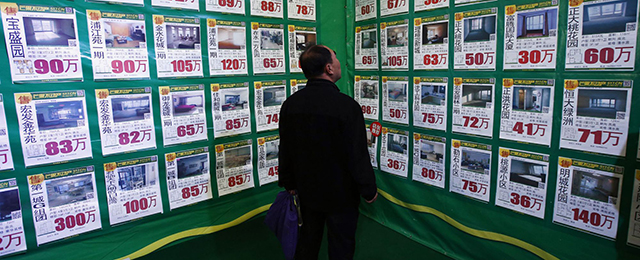“Stop imagining that China’s real estate market is about to collapse, there is no chance of that happening.” At least so is convinced China’s second richest man, Wang Jianlin, who recently uttered this lapidary statement.
And official media has been quick to repeatedly use Wang’s quote as an example of the robustness of the sector. But Dalian Wanda Group, billionaire Wang’s company, is one of the largest property groups in the country; and as such it is also sensitive to the slowdown that the market has experienced this last year.
Dalian Wanda Group, as well as other big conglomerates from the sector such Vanke, Poly, Evergrande or Country Garden, is suffering the consequences of the past few years rampant investment; which caused the current oversupply and the consequent drop in investment prices. These companies suffer from a lack of liquidity and limited access to credit but its leadership position in the market makes them less vulnerable. Conversely, the situation of hundreds of smaller developers is much more worrying. The recent halt on loans makes them unable to repay previous loans.
From January to November 2014 housing prices fell a 7.8%, an alarming decline compared to the 26% price increase last year. China’s real state sector represents a 15% of the national GDP; and it plays a crucial role in other sectors. Consequently the government is very keen on lending all the necessary support to maintain the speculative frenzy. For instance, Beijing recently raised the limit on the number of properties an individual is allowed to own (before the limit was set to two properties per person). And last November it suddenly issued an interest rates cut, for the first time since mid-2012.
But analysts believe that these measures will not solve the lingering structural problems of the housing market.
“Access to credit is more crucial than the cost of borrowing. Even though interest rates go down, access to credit is very difficult, so the weaker promoters will find it very hard to avoid a liquidity crisis when their property sales slowdown”, explains Su Lim, analyst at Fitch Ratings. Banks are very cautious in authorizing loans in areas where supply greatly exceeds the demand. Cities like Chongqing, with 30 million people, have a 38% of their commercial properties empty. And the projects still under construction account for a 500% of the current stock.
On top of that, the new measures issued by the Bank of China (PBOC) won’t necessarily encourage homebuyers to acquire new properties. Fitch estimates that cutting interest rates alone will save just a 0.3% of the house purchase price. So it seems that the oversupply of China’s real estate market will remain unless the government encourages more drastic measures.
Ling Pei is an example of the booming middle class that flourished in China the past few years. He managed to capture various properties that where widely appreciated thanks to the housing boom. But now he believes that this market is too risky and he prefers to invest his money in stock markets rather than the property sector.
“I have already sold some of my properties. I do not think that in the coming years they would bring high yields, so I prefer to sell them before prices go down”, says Ling.
And if individual home buyers like Ling himself are deciding to make their investments to markets with less risks, big companies like Dalian Wanda group are doing the same outside of China. Dalian Wanda Group plans to build a 6,000 million euro macro residential and leisure complex in Madrid. And the company has other projects underway in Los Angeles, Chicago and London. Wang Jianlin may not believe that the real estate bubble in China will explode. But just in case he is diversifying its investments away from the Asian giant.






Be the first to comment on "In-depth: China desperate at cooling down the property bubble"